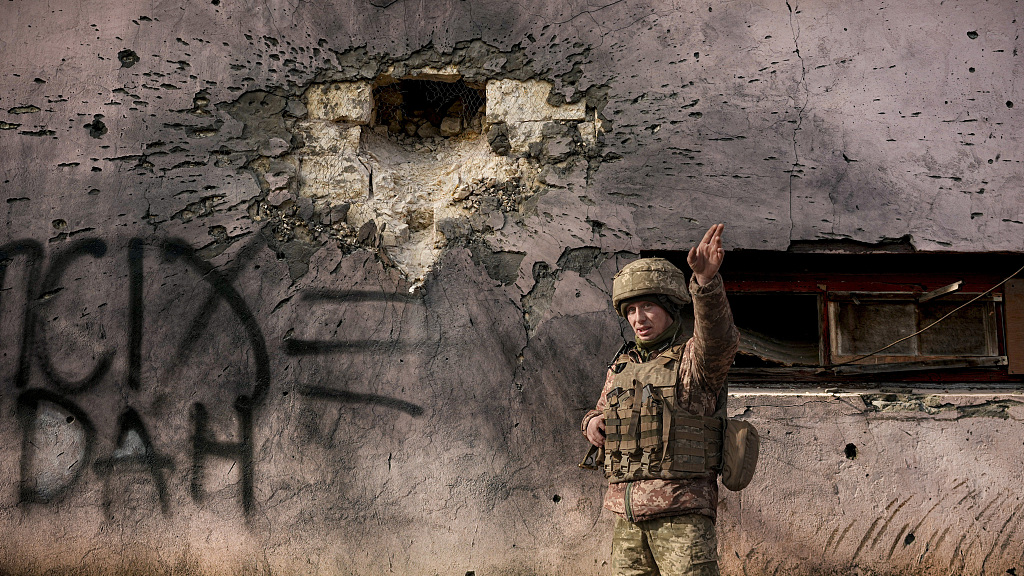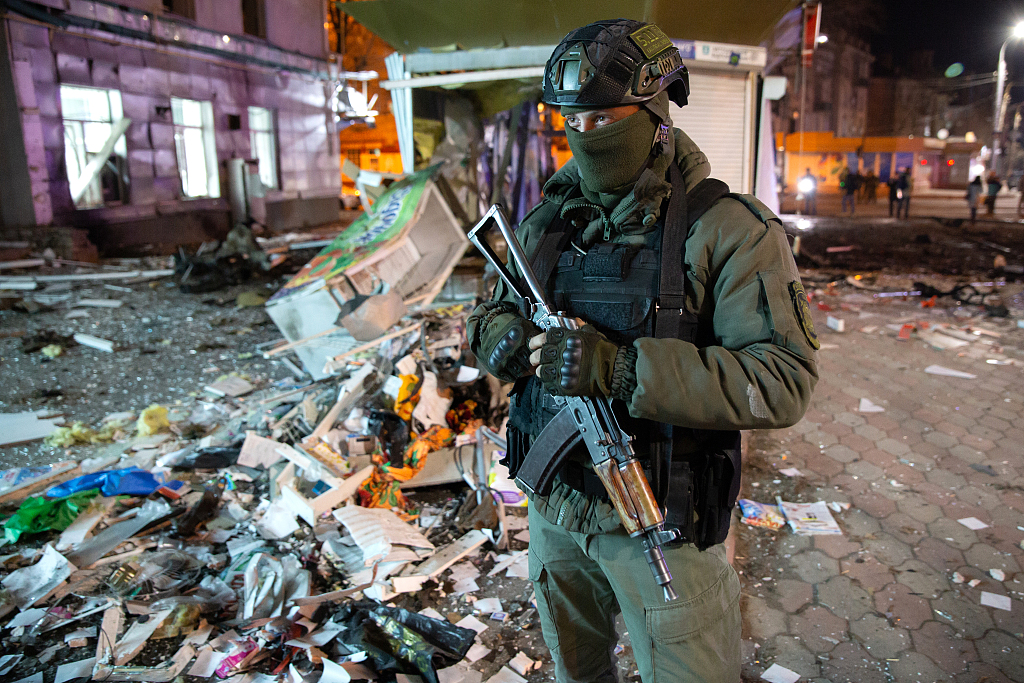
A Ukrainian serviceman points to the direction of the incoming shelling next to a building which was hit by a large caliber mortar shell in the frontline village of Krymske, Luhansk region, eastern Ukraine, February 19, 2022. /VCG
A Ukrainian serviceman points to the direction of the incoming shelling next to a building which was hit by a large caliber mortar shell in the frontline village of Krymske, Luhansk region, eastern Ukraine, February 19, 2022. /VCG
Editor's note: Hannan Hussain is a foreign affairs commentator and author. He is a Fulbright recipient at the University of Maryland, the U.S., and a former assistant researcher at Islamabad Policy Research Institute. The article reflects the author's opinions and not necessarily the views of CGTN.
The U.S. recently claimed that Russia has created "lists of identified Ukrainians to be killed or sent to camps following a military occupation," as Bathsheba Crocker, U.S. ambassador to the UN office in Geneva, wrote in a letter to United Nations Human Rights Office (OHCHR), which all but says that the U.S. disinformation campaign against Moscow on Ukraine is endorsed by the rights office as legitimate.
This pattern of manufacturing Russian aggression is all too familiar. Despite recurring efforts for some forms of diplomacy, Washington appears convinced that its narrative on the Ukraine situation must be driven by dangerous war fiction and counterproductive sanctions.
It is high time Washington ends its facade of "credible information" to discredit Moscow on any grounds it sees fit. February 16 is a case in point: If the U.S. intelligence was even remotely credible, why didn't the possibility of a so-called Russian invasion of Ukraine materialize then? Crocker's letter serves as the latest attempt to build on that same crescendo, evident in her characterization of a "new military offensive" from Russia.
For those keen to see a peaceful diplomatic effort materialize on Ukraine, one key dynamic demands profound concern: Washington's willingness to go to any length to argue a Russian "invasion" as inevitable.
For instance, U.S. Secretary of State Antony Blinken on February 17 alleged Moscow "will target specific groups of Ukrainians," prompting Crocker to give that empty speculation a go herself. More importantly, the letter wrongly accuses Moscow of "human rights abuses," and reveals in Crocker's own telling that such abuses may be likely "in the aftermath" of a "further invasion."
The world simply cannot afford any conflation between Washington's anti-Russian hysteria and the mandate of the OHCHR. This is particularly important because the letter includes attempts to blur the crucial distinction.
Consider groundless allegations of Russian military occupation and planned killings presented as information "in support of OHCHR's important mission." Not only does such dangerous conflation threaten to undercut OHCHR's autonomy on genuine human rights crises, it risks imposing a nation's ideological and political leanings on a platform that needs none of it.

The site of a car explosion outside a building of the representative office of the "Luhansk People's Republic" in the Joint Centre for Control and Coordination on ceasefire, Luhansk region, Ukraine, February 21, 2022. /VCG
The site of a car explosion outside a building of the representative office of the "Luhansk People's Republic" in the Joint Centre for Control and Coordination on ceasefire, Luhansk region, Ukraine, February 21, 2022. /VCG
International energies at present must remain focused on the sanctity of the Minsk Accords, despite turbulence from incoming military pressure from the West to the East. The agreements stand endorsed and recognized by the UN Security Council, and are valuable vehicles for keeping consensus-driven diplomacy afloat on Ukraine, no matter how slim the possibility is.
Look to the recent Group of Seven (G7) statement on Ukraine. The U.S. joined its counterparts to publicly support the accords' "full implementation," while recognizing them as the "only way forward for a lasting political solution." However, a failure to translate U.S. support into credible action, such as encouraging Kyiv to implement the accords, reinforces Moscow's broader point: When Russia's proposals for an equal dialogue go unanswered, it reserves every right to take measures to ensure its own security.
What remains to be seen is how long Washington can keep rationalizing its diplomacy-cum-confrontation approach toward Russia, while parading Western strengths on Ukraine through a military calculus.
As long as Washington keeps feeding its war hysteria over Ukraine, and demonizing Russia in the process, it risks impairing its exercise of meaningful diplomacy in the near future, no matter the military and economic levers.
For the sake of making U.S. credibility wane at least, how about less threats and better negotiations?
(If you want to contribute and have specific expertise, please contact us at opinions@cgtn.com.)

